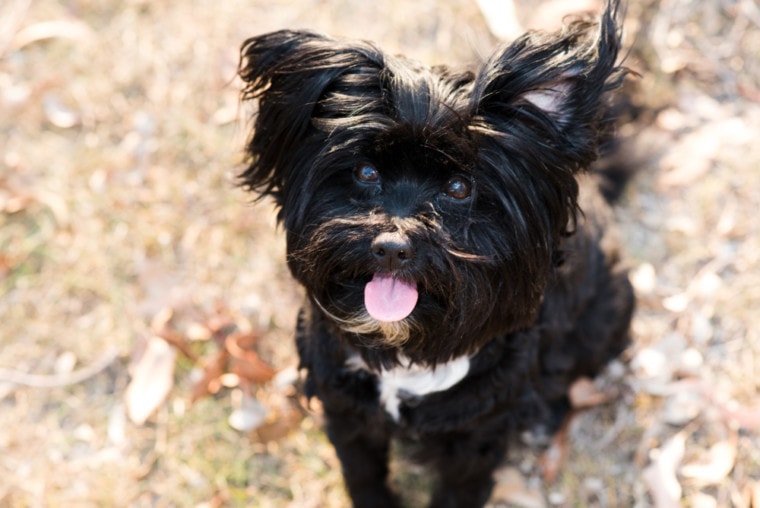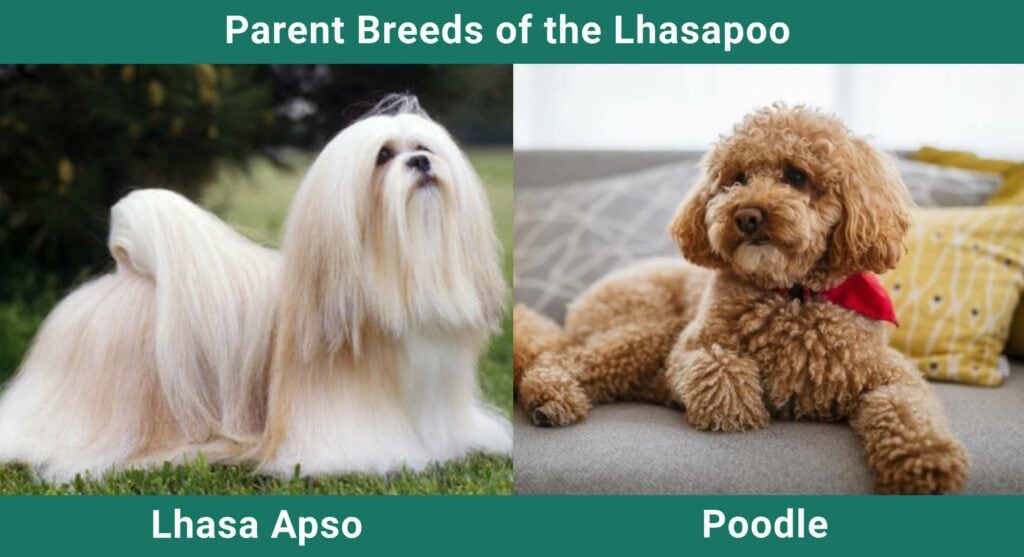
Click Below to Skip Ahead
The Lhasapoo, also referred to as a Lhasadoodle, is a small designer breed resulting from a mix between a Poodle or Miniature Poodle with a Lhasa Apso. They’re intelligent, playful, and fiercely loyal to their owners. Lhasapoos were first bred in the 1990s when the miniature dog craze was at its peak.
Breed Overview
Height:
9 – 13 inches
Weight:
10 – 20 pounds
Lifespan:
10 – 15 years
Colors:
White, apricot, cream, patterned, brown, black
Suitable for:
Excellent for families, good with children and other animals
Temperament:
Loyal to the owner, friendly, agile, playful, and affectionate
Their hair can be curly like a poodle’s or straight like a Lhasa Apso’s, and they have large eyes, short muzzles, and feathered ears that hang down. Lhasapoos are perfect for families, but they need proper training and socialization before living with small children. They have a mild temperament and only require moderate daily exercise. As long as they receive enough exercise, Lhasapoos are ideal for apartment living.
Lhasapoo Characteristics
Lhasapoo Puppies
Lhasapoos are friendly animals that crave human companionship, but they’re cautious around strangers and require adequate training while they’re puppies. They have a reputation for excessive barking and quickly sound the alarm when strangers approach your property. However, they tend to calm down after a few years and welcome visitors with joy when they recognize them.
It’s worth pointing out that these loyal dogs love being close to their owners at all times and are not happy with being left alone for more than a couple of hours. They are extremely intelligent, so they should be easily trained to be around other animals and people. They’re a great option for families with children looking for a small dog,

Temperament & Intelligence of the Lhasapoo
Lhasapoos are gentle and loving animals, but they can be overly protective of their owner. The stubborn, defensive behavior comes from the Lhasa Apso side of their family, but you can minimize the trait by enrolling your puppy in obedience training. The dogs are extremely intelligent (a trait from the poodle side), and they love interacting with humans. However, when they’re left in a strange place for more than a few hours, Lhasapoos can get anxious and timid around strangers. Leaving a Lhasapoo alone for more than a day can upset the animal, and you may have to wait a while after you return for the dog to warm up to you again.
Are These Dogs Good for Families? 👪
Lhasapoos are perfect for families, but they’re more relaxed around older children. That doesn’t mean they can’t live near toddlers, but they behave better around infants when they’ve completed obedience training. Although they’re tiny, Lhasapoos are skilled guard dogs that instantly alert the family to approaching strangers. They enjoy playing games with the family, but they establish a firm bond with one person. They’re more likely to listen to commands from their master.
Does This Breed Get Along with Other Pets?
Lhasapoos generally get along well with other dogs, but they need to be exposed to dogs and other animals when they’re young to establish their socialization skills. Although they’re less tolerant of other animals, they can learn to live with other pets when the animals grow up together.
Things to Know When Owning a Lhasapoo
Food & Diet Requirements 🦴
Lhasapoos have a tendency to become overweight when improperly fed, but you can keep their weight stable by providing ½ cup to 1 cup of dry dog food every day. They love to display their large puppy dog eyes when they’re begging for human food, but try to resist the urge of treating them with your scraps. Human meals often contain high levels of sodium, sugar, and preservatives that can be harmful to a Lhasapoo’s long-term health.
Exercise 🐕
With an almost endless supply of energy, Lhasapoos require daily exercise. Taking them for a walk and playing games in the yard will keep them healthy and fit. You don’t need a large property to run laps. They’re social animals that love playing catch and other games with the family. Because of their size, you can play games with them indoors and marvel at their ability to leap onto furniture. Although they can handle warm weather, they’re not fond of exercising on a cold or rainy day.
Training 🎾
Training is essential when your Lhasapoo lives with children and other animals. They’re not overly aggressive, but they become timid and anxious when they’re unsure of someone. When they interact with young children, you should supervise them closely until they become more accustomed to the little ones. Compared to other dogs, Lhasapoos are easy to train and learn commands quickly.
Grooming ✂️
Grooming requirements vary depending on the dog’s lineage, but they generally need their coats brushed at least three to four times a week. Lhasapoos are more vulnerable to ear infections than other breeds, and you should inspect and clean their ears weekly to prevent an infection.
Health and Conditions 🏥
As a mixed breed, Lhasapoos are susceptible to the medical problems associated with Poodles and Lhasa Apsos. Whether you adopt a dog or buy one from the breeder, it’s vital to inquire about the animal’s lineage and medical history. Collecting information from a shelter is more difficult, but some people provide the shelter with documentation when they put the animal up for adoption.
Serious Conditions:
Lhasapoos are prone to several medical conditions, including Addison’s Disease, Cushing’s Disease, Hypothyroidism, Von Willebrand’s Disease, Legg-Perthes Disease, kidney problems, and epilepsy. Taking a Lhasapoo for a checkup at least twice a year ensures that any medical issue is addressed before it progresses.
Minor Conditions:
With a short muzzle, Lhasapoos sometimes have trouble breathing after exercise and can develop brachycephalic airway syndrome. Other minor conditions include cataracts, hip dysplasia, ear infections, allergies, and dental problems. Regular brushing can prevent decay and reduce bad breath, but you should consult a veterinarian for dental hygiene tips. Some animals react wildly to brushing, and you may need another person to assist you in the process.
Male vs Female
Female Lhasapoos are smaller and lighter than males, but the dog’s personality depends more on the lineage than the sex. Lhasapoos who display more of their Lhasa Apso traits tend to be more protective of their territory and cautious around strangers. Whether you choose a male or female, be prepared for an energetic, loyal companion who rarely leaves your side.
3 Little-Known Facts About the Lhasapoo
1. Their Appearance Can Vary Significantly
The Poodle and Lhasa Apso are similar in size, but their hair and facial structure are quite different. When you buy a Lhasapoo as a puppy, it’s challenging to guess how they will look as adults. They can inherit the Poodle’s curly hair or the Lhasa Apso’s straight coat.
2. Ancestors to Lhasapoos Have an Intriguing History
Lhasa Apsos originated in Tibet, and they’re named after the holy city Lhasa. Their breeding dates back 4,000 years, and in Tibet, only monks and royalty were allowed to breed the animals. In contrast, the Miniature Poodle, the Lhasapoo’s other relative, was a talented circus performer until the mid-19th century.
3. Lhasapoos Do Not Shed
Lhasapoos are ideal for people with allergies or sensitives to dog hair because they’re hypoallergenic. They’re incredibly clean compared to other breeds and only require bathing when their coats are soiled from outdoor play.
Final Thoughts
With the sharp intellect of a poodle and the protective nature of a Lhasa Apso, the Lhasapoo gives you the best of both worlds. They thrive on human companionship, enjoy playing games, and are incredibly loyal to their owners. Although they’re susceptible to various medical conditions, they can live as long as 15 years.
When searching for Lhasapoo breeders in your area, ensure the owners are licensed and provide health and lineage documentation. Inspect their facilities for cleanliness and examine the behavior of the dogs. If a Lhasapoo puppy does not act like a ball of unrestrained energy, the creature may be malnourished or suffering from an illness. Lhasapoos require a high level of care and attention, but they spend their entire lives repaying you with undying love and loyalty.
Featured Image Credit: Tabatha Del Fabbro, Shutterstock








